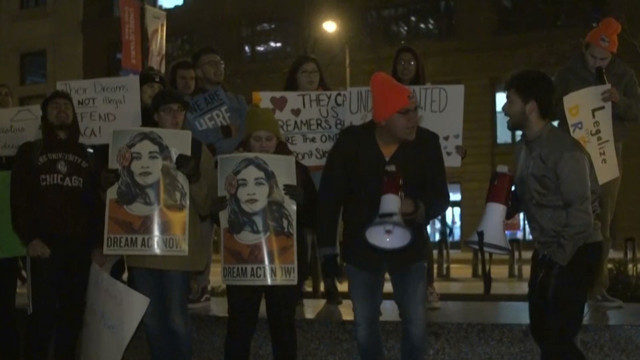Immigrants brought to the U.S. illegally as children are facing a key deadline–on March 5, the DACA program that protects them from being deported is set to expire.
But many are questioning whether the deadline will be enforced, and that’s making it even harder for those affected to decide what to do.
CGTN’s Dan Williams has details.
A busy evening in the kitchen of Son of a Butcher, a Chicago restaurant serving American and Mexican food. Owner Rick Rodriguez is also the hands-on chef. He employs dozens of people, but he’s in the U.S. under DACA.
Rodriguez arrived as an undocumented immigrant from Mexico in 1991, when he was only five years old. DACA gave Rodriguez–and close to 800-thousand others-the ability to legally work and live in the U.S.
But the announcement last year that the Trump government could end DACA has left those like Rodriguez with an uncertain future.
“It’s more stressful than anything, as you are trying to do something right and then you have someone telling you, no you can’t,” he said. “Every month, the restaurant’s taxes are like, over 20 grand, so you can imagine how much money we are contributing to the economy.
“So to have someone say, no, bye, bye,” he continued, shaking his head. “We are providing for the community, we are providing for the economy. Why we got to get kicked out?”
In central Chicago, a demonstration underlines the growing tension among Chicago’s DACA recipients and other undocumented immigrants.
This is just the latest protest against the potential ending of DACA, with many more planned in the coming weeks. For those here, it is an emotional process, and many here now fear for their future.
“The urgency of our humanitarian crisis is very real,” said this demonstrator. “122 people lose this protection every day. There is very much fear in the community, but we are united as one.”
Jose Vera is a second year law student. He already works for an organization that offers legal support for immigrant rights in Chicago’s southwest suburbs.
“We are all very concerned,” he said. “We are in a manufactured crisis. We are living with the consequences of very irresponsible decisions. It is very troubling as we see people getting picked up when they go to traffic court. It was very troubling to hear that.”
At Chicago’s Mexican consulate, The Resurrection Project, a religious community-based organization, offers advice and legal assistance to those confused by the change.
Laura Mendoza is among the helpers and a DACA recipient. She has this message for lawmakers.
“I think we are going to continue to push to have immigration reform,” said Mendoza. “We know there are 11 million undocumented immigrants. We know that 800,000 of them have a protection that they are going to lose so we want to continue to fight for a reform that makes sure that our families stay together and their communities stay together.”
Back at Rodriguez’s restaurant, he offers a “’Make America Great Again’ Trump burger.” It shows his sense of humor, but for him and other DACA recipients, the reality is uncertainty and despair.
 CGTN America
CGTN America

